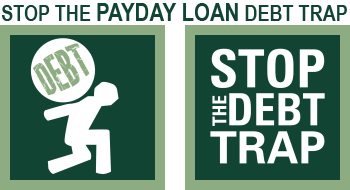October 29
Washington Post Online
Should the post office also be a bank?
The article discusses the potential for the U.S. Postal Service to provide banking services and to serve as an alternative to payday lenders in offering short-term loans to consumers in need. Support for the recommendation is growing, as advocates call for safer and more sustainable options for offering short-term credit.
October 23
Citizen-Times
Payday lender donations to McHenry prompt probe call
U.S. Rep. Patrick McHenry (R-NC) is among several members of Congress under investigation by the Office of Congressional Ethics for possible links between campaign contributions from payday lenders and support for legislation that would lighten regulations on the industry.
For more coverage:
October 23
WSFA-TV Online
Possible legislation could force reduction of maximum payday loan interest rate
In response to the staggeringly high growth of payday lending in Alabama, legislators in Mobile, Alabama met to discuss the possibility of enacting legislation to cap interest rates on payday loans at 36%.
October 23
Plain Dealer Online/Cleveland.com
Ohio Issue 1 campaign funded by payday lenders, other lobby groups
The payday lender Ohio Consumer Lenders Association is a strong contributor towards Ohio’s Issue 1 campaign, an attempt to change the way in which the state is divided into legislative districts.
October 23
ACA International
Scam by Callers Claiming to be from Advance America Expands into Kentucky
Following the increases in debt collection scams in Nebraska and Minnesota, the residents of Kentucky are now facing the same dilemma, as consumers are now receiving numerous calls claiming that they owe payday loan debts to Advance America.
October 24
Salon
Let’s make the banks serve us: How the government subsidizes the super-rich, while we pay the overdraft fees
In an interview with Mehrsa Baradaran, University of Georgia, the article discusses the predatory nature of payday lending, as well as ways to reduce reliance on such practices through alternative financial service options.
October 25
Deseret News Online
Letter: Rampant payday industry
In response to the article, “Utah payday loans lead many to debt trap”, a reader questions the lack of a strong campaign against predatory lending within the state.
October 29
Washington Post Online
Bernie Sanders has a pretty revolutionary idea to change America’s post offices
Presidential candidate Bernie Sanders continues to support a movement for the U.S. Postal Service to provide banking services, in an effort to reduce reliance on high-interest loans for borrowers in need of short-term loans.
For more coverage:
October 27
San Francisco Appeal Online
Program Launched To Help Low-Income Residents Find Safe Banking Options
A national program, Bank On National Account Standards, has been launched by the Cities for Financial Empowerment Fund in San Francisco to offer safe banking options to low-income residents, where the successful program, Bank On San Francisco, has provided access to bank accounts for numerous households across the city. These options will be safer alternatives to payday loans and other forms of predatory lending.
October 26
In These Times Online
Faced With Exorbitant Utility Costs, New York State Residents Fight To Keep The Lights On
The article mentions how taking out a payday loan can allow debt to spiral, rather than relieving a financial burden.
October 27
Salt Lake Tribune Online
Op-ed: Why don’t payday lenders give us all the facts?
The author argues for transparency within the state regarding the payday lending industry and calls for stronger regulations.
October 28
East Bay Express Online
Oakland Struggles to Hold Banks Accountable
The article sheds light on predatory lending practices in Oakland, such as payday lending, and highlights lack of transparency within the banking industry.
October 28
KSFY-TV Online
AARP new poll shows support for payday loan cap
An AARP poll conducted amongst residents over the age of fifty within the state of South Dakota has demonstrated strong support for capping interest rates on payday loans.
For more coverage:
October 28
myCentralJersey.com
Church’s dfree conference focuses on financial freedom
On Oct. 30 and Oct. 31, hundreds of black church leaders from across the United States will assemble to discuss a strategy to bring an end to high-interest, short-term loans that are deeply affecting their communities. The leaders will meet for the dfree Financial Freedom Conference at First Baptist Church of Lincoln Gardens.
For more coverage:
October 28
Argus Leader Online
My Voice: Limiting interest rates enhances freedom
The author argues against the claim that limiting interest rates on payday loans is curtailing the freedom of consumers, stating that, in reality, such regulations free consumers from the oppressive terms of predatory lending.
October 28
Weatherford Democrat
City to crack down on payday, title lenders
The Weatherford City Council in Weatherford, TX has passed an ordinance to increase regulatory oversight on payday and auto title loans in an effort to reduce the risk of consumers falling into debt traps.
October 30
Democracy Now
“How the Other Half Banks”: Author Says America’s Two-Tiered Banking System is a Threat to Democracy
In “How the Other Half Banks,” professor Mehrsa Baradaran explores how poor communities have been denied the normal banking opportunities. “Without normal banks, these communities have been at the mercy of check cashers and payday lenders, who charge rates and fees far higher than any normal institution. The result is a predatory system that helps keep low-income people in a crushing cycle of debt.”
